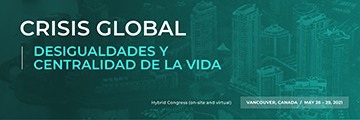 Session Inactivity
Session InactivityYour session has timed out. Click "Login" to login again or "Dismiss" to view the current page. If you dismiss you may cut and paste any work you were working on but any clicks on links or buttons may expire your session. |
 Session Inactivity
Session InactivityYour session is about to expire. You have less then 5 minutes remaining. If you are still working click the link below to refresh your session. |
 |
 |
LASA2021 / Crisis global, desigualdades y centralidad de la vida XXXIX International Congress of the Latin American Studies Association President of LASA Crisis global, desigualdades y centralidad de la vidaThe global crisis highlighted by the expansion of COVID-19 over the entire planet has had dramatic consequences in Latin America, testing the capacity of the states to protect their citizens. The effects of the illness, understood as a social and political event, have laid bare the structural shortcomings of the countries in the region and the dynamic persistence of inequity, exclusion, and authoritarianism. The consequences for the economy have been devastating in a region that was already experiencing problems with growth and the concentration of wealth. The pandemic has involved profound effects on social reproduction processes and everyday life in many social sectors on the continent. At the same time, this crisis has also ignited deep reflections about the centrality of life and health care in economic and social models, the urgency of confronting social inequalities, the imperative to act against environmental devastation, and the powerful need to also guarantee the democratic process. Additionally, COVID-19 is developing at the historical moment of greatest global connectivity. In this context, paradoxically, measures have emerged restricting movement and confining the national space in practically all countries, which has generated policies of control over the people and their bodies. Undoubtedly, these processes will have long-term effects in public and private life. The current crisis, in reality, exacerbates various tendencies that were already present in the social, cultural, economic, and political life of the region. We have experienced dramatic phenomena of human mobility that are illustrated in the exodus and mass intraregional movements or movements toward the societies of the world’s economic centers. Certain authoritarian political dynamics have also been reinforced in emergency contexts. Slow growth of economies, as well as the worsening of structural inequalities, reveal dynamics of the labor market characterized by informality and insecurity. Finally, the persistent exclusion of native peoples and African descendants and different scenarios of human rights violations are all processes showing that the need to deliberate on democracy is more valid than ever in the region. In the last year, Latin America and the Caribbean lived through widespread situations of social protest in various countries in the region. Mass movements were triggered not only around basic problems like poverty and social injustice but also demands related to the fight against gender violence and femicide, the legalization of abortion, enforced disappearances, the defense of natural resources and territories, movements for peace and against selective murders, and, of course, democracy. Social protest becomes a strategic site for understanding political cultures and the limits of our political systems at different scales: local, national, and global. The current crisis has created a series of ruptures that evidence memories of authoritarian expressions and practices in Latin America. The events of the last year invite us to rethink the current situation without forgetting the past and its legacy, and to exercise collective memory to identify the multiple cultural and societal responses that have been formulated in other critical periods. It is necessary, in this sense, to reflect on the different manifestations of power and its reproduction that societies have constructed throughout history to express their unrest and proposals for change. New challenges put pressure on states and societies in Latin America and the Caribbean. This call for LASA2021 congress is also a call to contribute from our disciplines and fields of knowledge to the debate around access to justice, basic rights, and the construction and consolidation of democratic regimes. Lastly, having the global nature of COVID-19 as the axis of discussion also offers the opportunity to link debates between the social sciences, the humanities, and other sciences such as biology and the health sciences. We hope that this congress will also make these bridges possible. This call plans for a hybrid congress that enables both face-to-face participation in the city of Vancouver, if the evolution of the global health situation allows it, and virtual participation. The deadline to submit proposals is September 7, 2020, 5 p.m. EDT. |
©2024 All Academic, Inc. | Privacy Policy |


